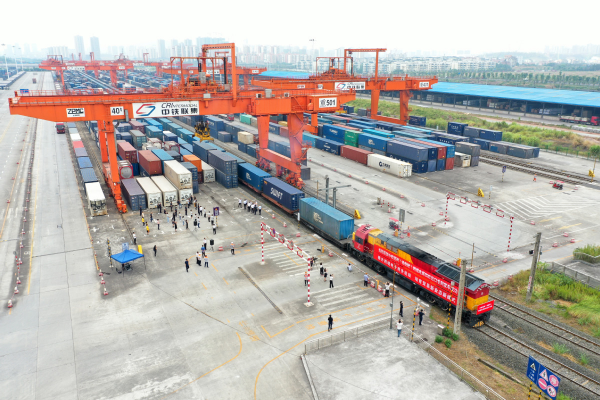Customs efforts open windows for exporters


Wei Jianguo, vice-chairman of the China Center for International Economic Exchanges, said that amid the global economic uncertainties caused by the COVID-19 pandemic and weak global demand, China's foreign trade sector has delivered a better-than-expected performance so far this year, with cross-border e-commerce and trade in services providing strong impetus.
In the first half, trade via cross-border e-commerce platforms-under the oversight of Customs authorities-rose by 26.2 percent year-on-year, with exports and imports up 28.7 percent and 24.4 percent, respectively, the GAC said.
As COVID-19 dealt a heavy blow to traditional trade models, cross-border e-commerce has become a major driving force for stabilizing foreign trade, he said.
Eager to boost foreign trade, the State Council decided at an executive meeting in April to set up 46 comprehensive cross-border e-commerce pilot zones, bringing the total number to 105.
Apart from applying practices proven effective in stimulating the flow of commerce, export-oriented companies in these zones are entitled to enjoy supportive policies, including exemption of value-added and consumption taxes on retail exports. Companies are also encouraged to jointly build and share overseas warehouses.
Zhengzhou, Henan province is one of the second batch of such pilot cities. Total foreign trade via e-commerce channels in the Zhengzhou Xinzheng Comprehensive Bonded Zone surged by 114 percent to 4.45 billion yuan between January and June. Imports in the zone almost doubled from last year, while exports rose more than fivefold.
Because of its advantages, including online trading and contactless delivery, cross-border e-commerce has played a positive role in helping foreign trade firms cushion against COVID-19 shocks and develop a new form of trade, said Qian Fangli, director-general of the department of electronic commerce and informatization at the Ministry of Commerce.
As cross-border e-commerce embraces robust growth, China's foreign trade performance also beat market expectations in recent months despite the adverse impact from shrinking global demand and restrictive overseas measures to contain the contagion, Qian said.
China witnessed positive growth in exports in April for the first time this year. The momentum was sustained through July as it total foreign trade volume rose 6.5 percent year-on-year to 2.93 trillion yuan during that month, with exports and imports up 10.4 percent and 1.6 percent, respectively, said Customs.
Despite facing a shrinking global trade market, China's share is growing larger, indicating the rising competitiveness of its foreign trade sector and increasing capacity to counter pressure, said Dang Yingjie, deputy director-general of the National Office of Port Administration at the GAC.
The situation for foreign trade and investment, however, is still grim as the worldwide spread of COVID-19, a severe global economic recession and significant declines in international trade and investment as well as rising protectionism are all taken into account, said Assistant Commerce Minister Ren Hongbin.
To further stabilize foreign trade and push the world's economic recovery, the central government announced in August it had issued a guideline to roll out more measures aimed at protecting foreign trade entities and keeping supply chains stable.
More efforts will be made to help foreign trade firms expand their clientele and improve trade facilities and services, including cross-border e-commerce platforms, cross-border logistics and overseas warehouses, according to the government document.
For many traditional trade firms, cross-border e-commerce remains a vital option for digital transformation and an effective hedge against external risks, said Zhao Ping, director of the international trade research department at the China Council for the Promotion of International Trade Academy.
Ni Yuefeng, the GAC's minister, said the administration will further simplify clearance procedures and cut logistics costs to optimize the business environment at ports in the second half. It will continue to advance reforms in the regulation of cross-border e-commerce to help businesses better tap the global market.
GAC currently oversees 42 Customs districts which operate through a total of 678 Customs houses nationwide.




